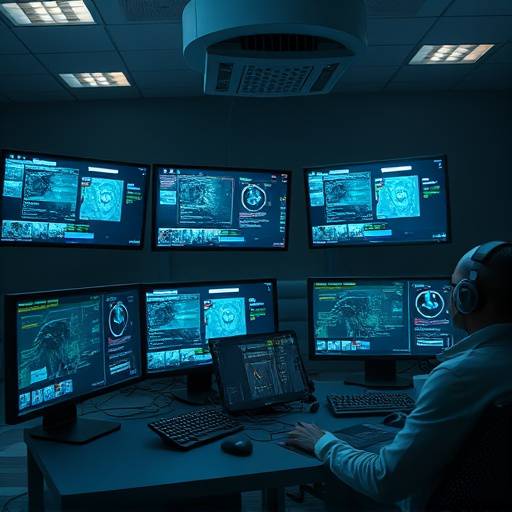AI-Powered Game Testing: Ensuring Quality and Performance

In the fast-paced and highly competitive gaming industry, ensuring the quality, stability, and performance of a game is paramount. Traditional game testing methods often fall short in addressing the complexities of modern games, which are characterized by vast open worlds, intricate gameplay mechanics, and dynamic player interactions. AetherForge Innovations is revolutionizing game testing through the application of Artificial Intelligence (AI), providing solutions that automate testing processes, detect bugs more efficiently, and optimize game performance to deliver exceptional player experiences.
Our AI-powered game testing solutions leverage machine learning algorithms and deep learning models to simulate a wide range of player behaviors, stress-test game systems under various conditions, and analyze game performance metrics in real-time. By mimicking human players and intelligently exploring game environments, our AI agents can uncover hidden bugs, identify performance bottlenecks, and provide actionable insights to improve game quality.
Dr. Kenji Tanaka, our Lead AI Developer, explains, "AI brings a new level of thoroughness and efficiency to game testing. Our AI agents can play the game for thousands of hours, exploring every nook and cranny, uncovering bugs that human testers might miss. This allows developers to focus on refining gameplay and adding new features, rather than spending endless hours on manual testing."
Automated Bug Detection
One of the key advantages of AI in game testing is its ability to automate the bug detection process. Traditional bug hunting relies heavily on manual testing, which is time-consuming, labor-intensive, and prone to human error. AI-powered bug detection systems can automatically identify a wide range of issues, including:
- Functional Bugs: Incorrect game logic, broken quests, and non-functional items.
- Graphical Bugs: Texture errors, clipping issues, and visual artifacts.
- Performance Bugs: Frame rate drops, memory leaks, and CPU spikes.
- Collision Bugs: Issues with character movement, object interactions, and environmental collisions.
Our AI agents are trained to recognize these issues by analyzing game states, monitoring system performance, and comparing game behavior against expected outcomes. When a bug is detected, the AI system automatically generates a detailed bug report, including steps to reproduce the issue, relevant system logs, and screenshots or video recordings.
To illustrate the power of AI-driven bug detection, consider a recent project where we helped a San Francisco-based indie game developer identify and fix over 500 bugs in their upcoming open-world RPG. Using our AI testing platform, we were able to significantly reduce the number of bugs that made it into the final release, resulting in a more polished and enjoyable player experience. "The AI testing tools from AetherForge Innovations were a game-changer for us," said the lead developer. "They helped us catch bugs we would have never found through manual testing, saving us countless hours of work and improving the overall quality of our game."
Performance Optimization
In addition to bug detection, AI can also play a crucial role in optimizing game performance. Modern games are incredibly complex and resource-intensive, and ensuring smooth performance across a wide range of hardware configurations can be a major challenge. Our AI-powered performance optimization tools can automatically identify performance bottlenecks, analyze resource usage, and recommend optimization strategies to improve frame rates, reduce loading times, and minimize memory consumption.
Some of the key techniques we use for AI-driven performance optimization include:
- Resource Profiling: Analyzing CPU, GPU, and memory usage to identify performance bottlenecks.
- Scene Optimization: Reducing polygon counts, optimizing textures, and culling unnecessary objects to improve rendering performance.
- AI Behavior Optimization: Optimizing AI algorithms to reduce CPU load and improve responsiveness.
- Network Optimization: Reducing network latency and improving bandwidth utilization for online games.
Our AI systems can automatically test game performance on a variety of hardware configurations, simulating different player settings and network conditions. This allows developers to identify performance issues that may only occur on specific hardware or under certain circumstances.
AI Testing Strategies
AetherForge Innovations utilizes several AI-driven strategies to comprehensively test games:
- Reinforcement Learning: AI agents learn to play the game through trial and error, discovering optimal strategies and uncovering unexpected behaviors.
- Evolutionary Algorithms: Evolving populations of AI agents to maximize coverage and find edge cases.
- Fuzzy Logic: Simulating player emotions and behaviors to create more realistic and unpredictable testing scenarios.
- Neural Networks: Training neural networks to recognize patterns and anomalies in game data.
Our team works closely with game developers to tailor these strategies to the specific needs of each project, ensuring that the AI testing process is effective and efficient.
The Future of AI Game Testing
As AI technology continues to evolve, the potential for AI in game testing is only going to grow. In the future, we can expect to see even more sophisticated AI systems that can automatically generate test cases, analyze game code, and even fix bugs autonomously. AI will become an indispensable tool for game developers, helping them to create higher-quality games that deliver exceptional player experiences.
"AI is transforming the way games are tested and optimized. By automating key aspects of the testing process, we can help developers create games that are more stable, performant, and enjoyable for players." - Dr. Anya Sharma, CEO of AetherForge Innovations
Learn more about our other AI solutions for game development, including AI-Driven Design , Narrative Generation , and Procedural Content Creation .
Ready to improve your game testing process? Visit our Contact Page to learn more.
| Name | Title | Specialty | Years of Experience |
|---|---|---|---|
| Kenji Tanaka | Lead AI Developer | Reinforcement Learning | 10 |
| Maria Rodriguez | AI Testing Engineer | Automated Bug Detection | 5 |
| David Chen | Performance Optimization Specialist | Resource Profiling | 8 |